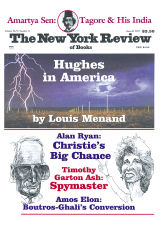In response to:
Germany vs. the Scientologists from the April 24, 1997 issue
To the Editors:
In your issue of April 24, 1997, Josef Joffe, an editor of the German newspaper Süddeutsche Zeitung, attacks the open letter to Helmut Kohl protesting German discrimination against Scientologists. I drafted the letter and a number of my friends signed it. Mr. Joffe criticizes what he asserts is a comparison to the Holocaust. But we never made such a comparison. No one equated the present situation to the death camps. The only comparison we made was to the early days of the Nazi regime, in 1933 and 1934, when discriminatory legislation was passed against the Jews that was quite analogous to today’s enactments against the Scientologists.
Mr. Joffe argues that there has been no Kristallnacht for Scientologists. We never said there was. Kristallnacht occurred in November 1938, years after the period to which our open letter referred. The first mass transport of Jews to the camps occurred only then.
Mr. Joffe also claims our charges of discrimination are overstated. He is not correct in this either. Before the Herald Tribune printed the open letter, it demanded written evidence supporting each charge. Each is demonstrably true. Mr. Joffe concedes the existence of German laws against hiring Scientologists and awarding them government contracts. He claims these laws have not had a significant impact. How could he possibly know that? How could he possibly know how many applicants for government jobs have been rejected because they were Scientologists or how many Scientologists refrained from even applying for such jobs because of this appalling legislation?
And isn’t the very existence of such laws and the hysterical witch hunting Mr. Joffe concedes is occurring in Germany quite enough to warrant our protest?
Interestingly, Mr. Joffe’s own newspaper, like every other German paper, refuses to publish the open letter.
Bertram Fields
Law Offices of Greenberg Glusker Fields Claman & Machtinger
Los Angeles, California
Josef Joffe replies:
Mr. Fields puts me in an awkward position, as I certainly do not want to defend the more egregious statements against Scientology by some German politicians. Nor do I want to support the exclusionary policies sponsored by state governments and parties in Germany. As I wrote in my article in these pages, these actions are not worthy of a liberal polity.
Nonetheless, Mr. Fields (who drafted the Open Letter to Chancellor Kohl) has not done his homework. There is no document he could cite that would support the charge that “Scientologists cannot obtain employment by your [the Federal] government.” Instead, let us refer to George Stoffel, a Scientology spokesman in Bavaria: He admits, as I wrote, “that he knows of no case where Scientologists have been denied employment by the state [of Bavaria].”
The Open Letter says: “In the 1930s, it was the Jews. Today it is the Scientologists,” thus drawing a direct comparison between the persecution of the Jews then and of Scientologists now. The comparison is, and remains, obscene. Mr. Fields now says he did not mean the entire 1930s, just 1933 and 1934, which is a curiously foreshortened definition of “the 1930s.” It is all the more curious since the Open Letter goes on to state: “This organized oppression [of Scientologists] is beginning to sound…like the Germany of 1936.”
OK, let’s see what happened to the Jews between 1933 and 1936. By February 1933, Jews were dispatched to the first concentration camps. In April 1933, the Nazis organized the boycott of Jewish businesses, and, by the mid-1930s, had banished Jews from the professions, the state bureaucracy, and from economic life in general. On September 15, 1935, the “Nuremberg Laws” were passed. Jews were henceforth no longer citizens of the Reich, and intermarriage with “real” German nationals was punished by long prison terms.
So much for the heinous record. If Mr. Fields thinks that such treatment is being meted out to Scientologists in today’s Germany, he is simply misinformed. But to paraphrase Talleyrand, his Open Letter was worse than an insult; it was a mistake. For it allowed German politicos of all stripes just to shrug it off as expensive hate mail—which they could not have done so easily if the Open Letter to Kohl had been more sober and truthful.
This Issue
June 26, 1997



